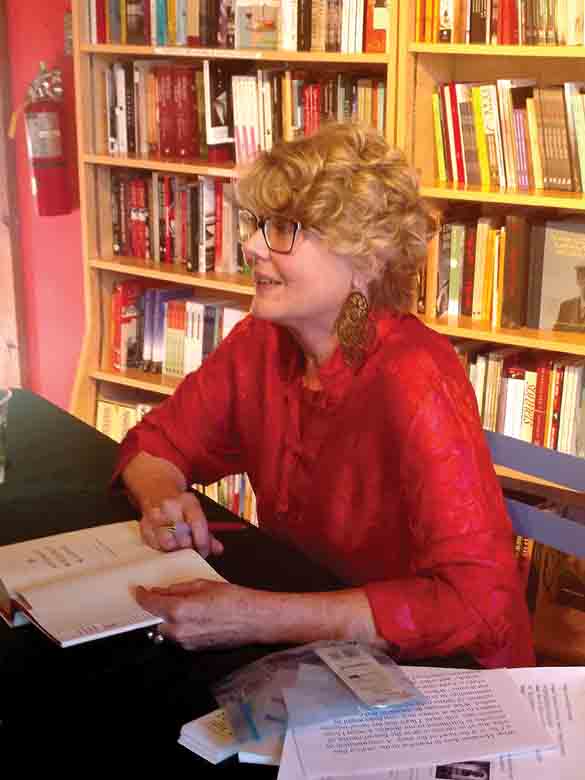 Elizabeth Church signs copies of her new novel in May at Collected Works in Santa Fe. Photo by Roger Snodgrass/ladailypost.com
Elizabeth Church signs copies of her new novel in May at Collected Works in Santa Fe. Photo by Roger Snodgrass/ladailypost.com
“The Atomic Weight of Love” is Los Alamos novelist Elizabeth Church’s first book, written by an unproven, non-celebrity writer, not even a relative of Los Alamos’s most famous literary figure, the poet Peggy Pond Church.
Elizabeth Church is on her own hook. Born and raised in Los Alamos and a resident, after thirty years of a legal career, without an advance or safety net, she has written a novel that she had promised herself she would write and with extraordinary skill, she has unfolded the story of a beautiful spirit in high resolution.
It is a woman’s book that men should read and take to heart, but probably won’t, which is also part of the story.
Written in the first person as a fictional memoir, “The Atomic Weight of Love,” is the juice of 87-year-old Meridian Wallace’s inspiring life. The plot takes a while to load, but when it gets going, when the catalyst comes along, fasten your seat belt and grab a box of tissues.
In the beginning we meet a bright young woman who recalls falling in love with Alden Whetstone, her college physics professor, who is a bit of a mess physically, but has world-class credentials in his field. He is also a widower twenty years her senior. Meridian wants to be an ornithologist, wants to study birds, and her physics teacher bowls her over with a brilliant description that serves as a prelude for the story.
“Flight requires defiance of gravity and is really, when you think about it, a bold act,” he says, during a lecture that Meridian happens to attend. “We think about vertebrate flight as falling into four categories: parachuting, gliding, actual flight, and soaring, if a bird can soar, generally, speaking it can also perform the three lower forms of flight…Don’t confuse gliding and soaring. To soar, an animal must have evolved to possess specific physiological and morphological adaptations, and soaring birds must know how to use the energy of thermals to maintain altitude.”
“O lord,” Meridian thinks, captivated, “he is speaking my language.”
Just before Alden is summoned to work on a secret military project in Northern New Mexico early in World War II, he proposes and Meridian accepts. But she stays behind in Chicago to finish her degree even after the two are married, foreshadowing future domestic problems and patriarchal presumptions. When war-torn circumstances finally allow for her to join her husband, it seems normal that she would have to give up her own promising career opportunities and defer not only to him, but to his existential responsibilities.
Of course, he is not allowed to talk about the atomic bomb project that takes priority over everything in their relationship, but he has hinted: “The greatest discovery of this century. Of several centuries,” he says. And then, struggling to express the idea without violating the secrecy, he finds the phrase, “Earth-shattering.”
In her long struggle to adapt to life in Los Alamos, Meridian returns again and again to her passion for birds that she can’t formally pursue. She begins a long-term study of a family of crows, who teach her a great deal about the family of her fellow humans. The birds are not only insightful and interesting to watch but also an effective organizing motif for the novel.
While she immerses herself in the natural environment in order to get closer to the subjects of her observations, Alden’s world is one in which someone is constantly listening and looking over his shoulder because of wartime security concerns, which puts daily existence under the strain of constant surveillance and stifles even innocent conversation.
“I took Alden’s hand, willing my thoughts to enter his bloodstream through that skin-to-skin contact, wanting him to know that while we couldn’t really discuss much of his life, I honored his sacrifice.” Meridian reflects. “I was determined to focus on something other than the leviathan secret weighing on our marriage, our intimacy.”
At first the book lulls one into thinking it is period piece about the stodgy world of mid-twentieth century American domestic life when prejudice and discrimination against women was practically a matter of fact, but then it becomes a story about the social bombshell of sex, drugs and rock-and-roll, and the culture wars of the sixties. Church’s novel of agonizing disappointments and impossible choices gathers it all together for a powerfully emotional ending.
Not surprisingly, Church says the Atomic Weight of Love is doing well and her second book is in the works.
Church will talk about the book at Mesa Public Library’s monthly Authors Speak program at 7 p.m. Thursday, June 23.

